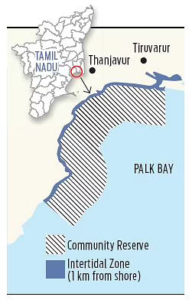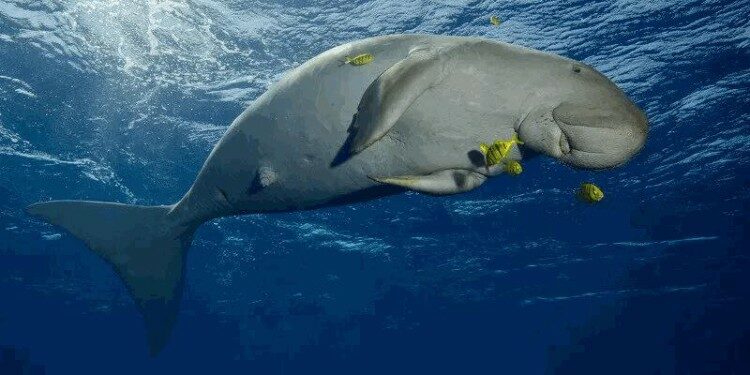In news– The Government of Tamil Nadu will set up India’s first Dugong Conservation Reserve in the Palk Bay Dugong.
About the Conservation Reserve-
- The Conservation Reserve will cover an area of 500kms.
- The proposed conservation area has the highest concentration of dugongs in the country.
- The reserve will span the northern part of the Palk Bay from Adirampattinam to Amapattinam.
- AS part of the CAMPA-Dugong Recovery Project, various surveys were conducted in the Palk Bay and Gulf of Mannar, from November 2016 to March 2019.
- Gulf of Mannar is a shallow bay area between the south eastern end of Tamil Nadu and western Sri Lanka.

About Dugongs-
- The dugong , also called the sea cow, is a herbivorous mammal.
- It is one of four living species of the order Sirenia, which also includes three species of manatees.
- It is the only living representative of the once-diverse family Dugongidae.
- The dugong is the only sirenian in its range.
- Dugongs are cousins of manatees and share a similar plump appearance, but have a dolphin fluke-like tail.
- And unlike manatees, which use freshwater areas, the dugong is strictly a marine mammal.
- They can grow upto three meters long, weigh about 300 kilograms, and live for about 65 to 70 years, grazing on seagrass and coming to the surface to breathe.
- They are found in over 30 countries and in India are seen in the Gulf of Mannar, Gulf of Kutch, Palk Bay, and the Andaman and Nicobar Islands.
- According to Wildlife Institute of India (WII) estimates, only 200-250 Dugongs are left in the wild, of which 150 are found in the Palk Bay and Gulf of Mannar in Tamil Nadu.
Threats
- The loss of seagrass habitats, water pollution and degradation of the coastal ecosystem due to developmental activities have made life tough for these slow-moving animals.
- Dugongs are also victims of accidental entanglement in fishing nets and collision with boats, trawlers.
Conservation status
- IUCN- Vulnerable
- Dugongs are listed in Appendix I of the Convention on International Trade in Endangered Species of Wild Fauna and Flora (CITES), which prohibits the trade of the species and its parts.
















